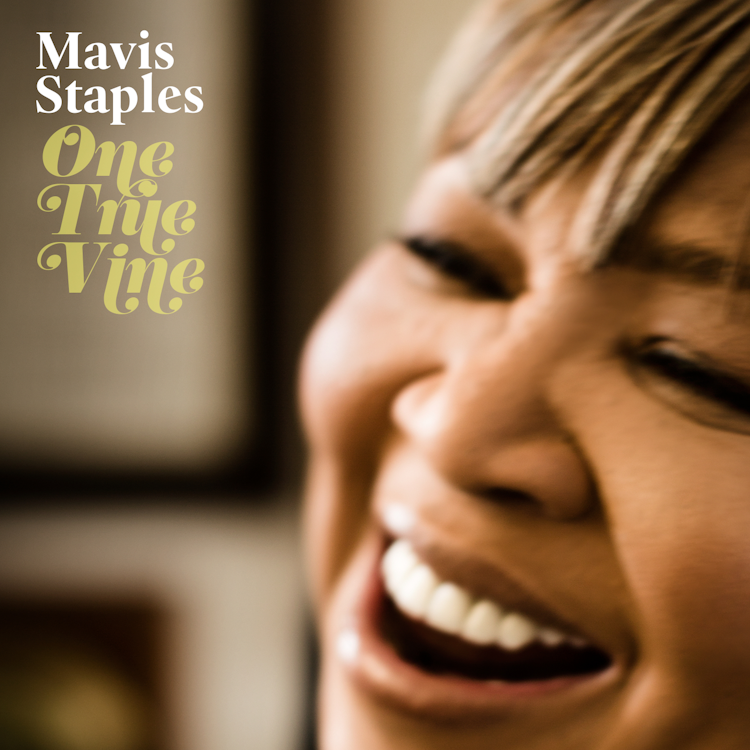"One True Vine"

You Are Not Alone, Mavis Staples’ first collaboration with Wilco’s Jeff Tweedy, was an astonishing surprise; her earlier ‘comeback’ records from the last decade had seen her relying on rootsy gospel (ahem) staples, and teaming up with the likes of Ry Cooder and Ladysmith Black Mambazo to add some extra (if far-from-necessary) authenticity to her return to recording. Alone, however, allowed her to just get on with things her way. Tweedy’s production was sparse and simple, the choice of songs – the Wilco frontman’s heartbreaking title track, moving covers of Randy Newman and John Fogerty, and the traditional material on which she had built her reputation – was inspired and, with her live band in tow, the album made for a powerhouse second act from a soul icon.
The shorter, darker follow-up, One True Vine, takes a more introspective turn, and yields vastly different results. Things are still kept in the family, but this time it’s the Tweedy family – Jeff is responsible for almost all of the instrumentation, save drums from his son Spencer – so there’s less opportunity for the musicians to play off each other, leading to an almost claustrophobic atmosphere to the record. Fortunately, Staples remains the same – whether transferring Alan Sparhawk’s cynicism into unbridled faith on ‘Holy Ghost’ (cheekily purloined from Low’s Tweedy-produced The Invisible Way LP from March) to her commanding performance of ‘I Like the Things About Me’, an old Staples Singers number that gets mutated into a minimalist bass’n’drums funk workout replete with all manner of sci-fi guitar skronkery.
But it’s touches like that which make One True Vine seem more like a Jeff Tweedy solo effort with a guest vocalist, rather than a Mavis Staples record. His presence, unsurprisingly, dominates the record – there are three of his songs scattered across the album (including the title track, a hymnal reworking of a Sky Blue Sky-era b-side) – and Staples sounds frequently sounds like she is trying to fit in with Tweedy’s vision, rather than the other way around (as it ostensibly should be). Those aforementioned Tweedy songs are also far from his best; ‘Every Step’ is an undercooked one-chord vamp, and the low-key ‘Jesus Wept’ sounds like Wilco on autopilot; meanwhile, the acoustic cover of Funkadelic’s ‘Can You Get to That’ is a risk that doesn’t quite pay off, sounding more like a rehearsal room offcut than an arrangement for a legend like Staples.
The record’s greatest shots of redemption are clustered at its centre. The traditional gospel slider ‘Sow Good Seeds’ is vintage Mavis, conjuring up all manner of stomping backporch imagery, and Washington Phillips’ ‘What Are They Doing in Heaven Today?’ is a slow-burning country waltz with Staples wrapping her smoky voice perfectly around the song’s apocalyptic imagery. Best of the bunch is Nick Lowe’s ‘Far Celestial Shore’; a veteran of albums like this – Johnny Cash’s take on ‘The Beast in Me’ is nothing short of definitive – and this calmly propulsive masterpiece, given deft flashes of strings and choirs by Tweedy, surely ranks as one of Staples’ and Lowe’s finest works.
So it’s not all doom and gloom by any stretch, but after a record like You Are Not Alone, Mavis and Tweedy (as she affectionately calls him) were right to fuck with the formula. It may not always live up to its title, but it’s certainly an interesting branch of what will hopefully continue to be a long and fruitful partnership.
Get the Best Fit take on the week in music direct to your inbox every Friday

Momma
Welcome To My Blue Sky

L.A. Witch
DOGGOD






